
Previously, project management software was considered more suitable for larger businesses as they have broader and more complex projects and teams to manage. However, it is becoming more apparent that even small businesses need to use digital tools to maximize their efficiency and output to stay competitive and ultimately scale in today’s highly competitive business landscape. Here are ten of the best project management software tools of 2023.
We compared ten project management solutions across their features and key factors like pricing and free trials to yield the following table:
| Software | Native time tracking | Reporting and analytics | Multiple views | Collaboration features | Pricing | Integrations |
|---|---|---|---|---|---|---|
| Asana | Yes | Yes | Yes | Yes | Starts at $10.99 per user per month | 200+ apps |
| Wrike | Yes | Yes | Yes | Yes | Starts at $9.80 per user per month | 40+ tools |
| monday.com | Limited | Yes | Yes | Yes | Starts at $8 per user per month | 200+ integrations and apps |
| Trello | No | Limited | Yes | Yes | Starts at $5 per user per month | 195+ integrations |
| ClickUp | Yes | Yes | Yes | Yes | Starts at $7 per user per month | 40+ native integrations |
| Airtable | Limited | Yes | Yes | Yes | Starts at $10 per user per month | 30+ tools |
| Notion | No | Yes | Yes | Yes | Starts at $8 per user per month | 70+ integrations |
| Todoist | Yes | Limited | No | Limited | Starts at $4 per user per month | 90+ integrations |
| Teamwork | Yes | Yes | Yes | Yes | Starts at $5.99 per user per month | 100+ integrations |
| Zoho Projects | Yes | Yes | Yes | Yes | Starts at $4 per user per month | 300+ apps |
Jump to:
Asana is one of the top-rated tools for project management and work management, as it delivers critical features ranging from forms to boards, timeline management, automation and universal reporting, among other effective features for small businesses.
As a project management software, Asana ensures that users do not have to constantly move between different tools, such as email and spreadsheets, to manage their projects.
Asana offers a free plan that remains free forever, ideal for those just starting out. You can opt for the Premium plan at $10.99 per user per month when billed annually, the Business tier at $24.99 per user per month, also billed annually, or the Enterprise tier which requires you to contact Asana for a quote.
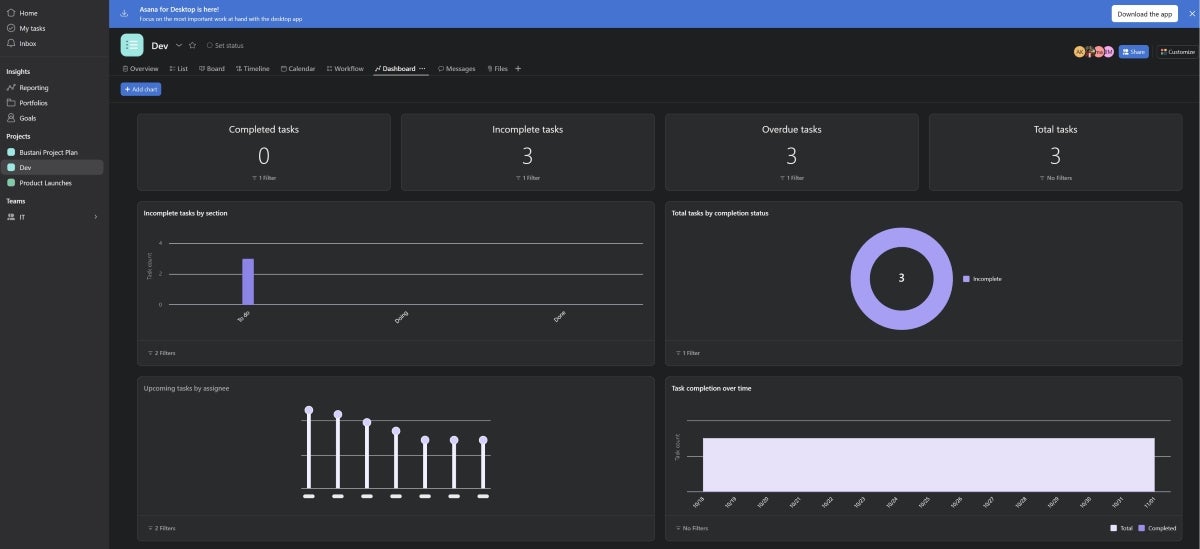
Asana boasts over 350 app integrations, including Slack for communication and GitHub for code management.
It’s difficult to come across a project management tool that strikes a perfect balance between functionality and user experience. Asana comes close to that as it stands out for its robust feature set that doesn’t compromise on user experience. Its thorough roster of powerful features makes it a go-to for small businesses of all shapes and sizes.
For more information, check out our full Asana review.

Wrike is an all-in-one platform for managing projects, organizing work, enhancing collaboration and accelerating execution across the departments of its users. As project management software, Wrike empowers its customers to align their strategy with their execution to deliver success. Wrike cuts across strategic planning, project portfolio management, program and project management and corporate development.
In addition to a free plan, Wrike offers a Team plan that costs $9.80 per user per month and there’s also a Business plan at $24.80 per user per month for more comprehensive needs. It also has Enterprise and Pinnacle plans, whose pricing information you’ll need to contact Wrike for.
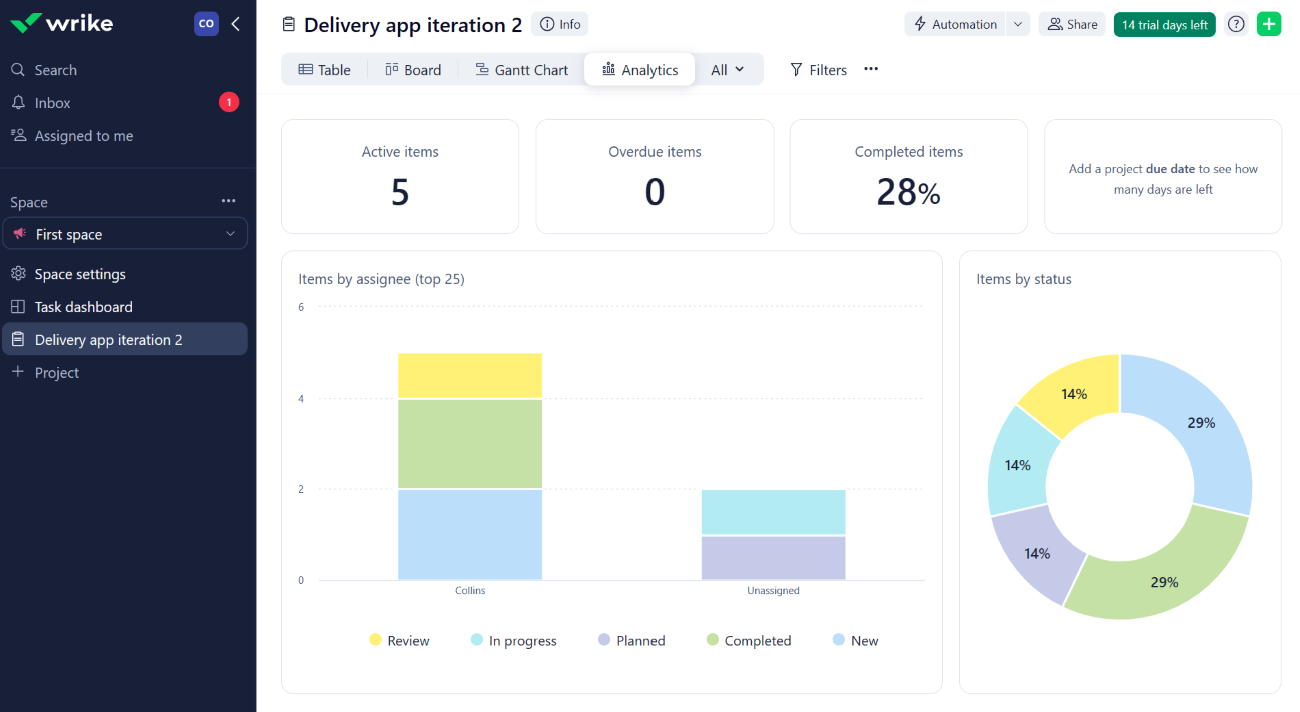
Wrike natively integrates with 40+ tools, including Microsoft Teams, Zoom, Tableau, OneDrive, Outlook, Slack and Adobe Creative Cloud.
Wrike is the epitome of an all-in-one solution, with features that cater to both project management and team collaboration. Its reporting capabilities are unparalleled, which is a plus for small teams that leverage data for decision-making.
For more information, check out our full Wrike review.

monday work management is a monday.com platform that enables its customers to plan, manage and collaborate on projects or portfolios. As a small business project management software, it is popular since it cost-effectively delivers a balanced range of features that are of value and impact to small businesses.
Monday work management provides the toolkit to manage a variety of aspects of a project, from project requests and approvals, to risk registers, resources, dependencies, project views and advanced Gantt.
Free plan aside, monday offers a Basic plan starting at $8 per user per month and Standard and Pro plans at $10 and $16 per user per month, respectively, all billed annually. For its Enterprise plan, custom pricing is available upon request

monday offers more than 200 integrations and applications across communication, marketing, CRM, finance, development and collaboration. The most popular ones include Jira, SAP, Google Chat, Power BI, GitHub and Slack.
For a starting price of $8 per user per month when billed annually, monday offers something for every kind of team, especially small teams seeking a competent yet cost-effective tool. It has a vast range of integrations and applications, as well as features.
For more information, check out our full monday work management review.

Trello delivers flexible work management and project management software that empowers teams to collaborate on projects, ideate, organize workflows and keep track of project progress visually. Its simplicity and flexibility, alongside its impressive Kanban boards and generous free plan, make the tool quite popular among small businesses.
Besides a free plan, Trello delivers a Standard plan at $5 per user per month and a Premium plan at $10 per user per month. Larger teams can opt for the Enterprise plan, priced at $17.50 per user per month, all billed annually.
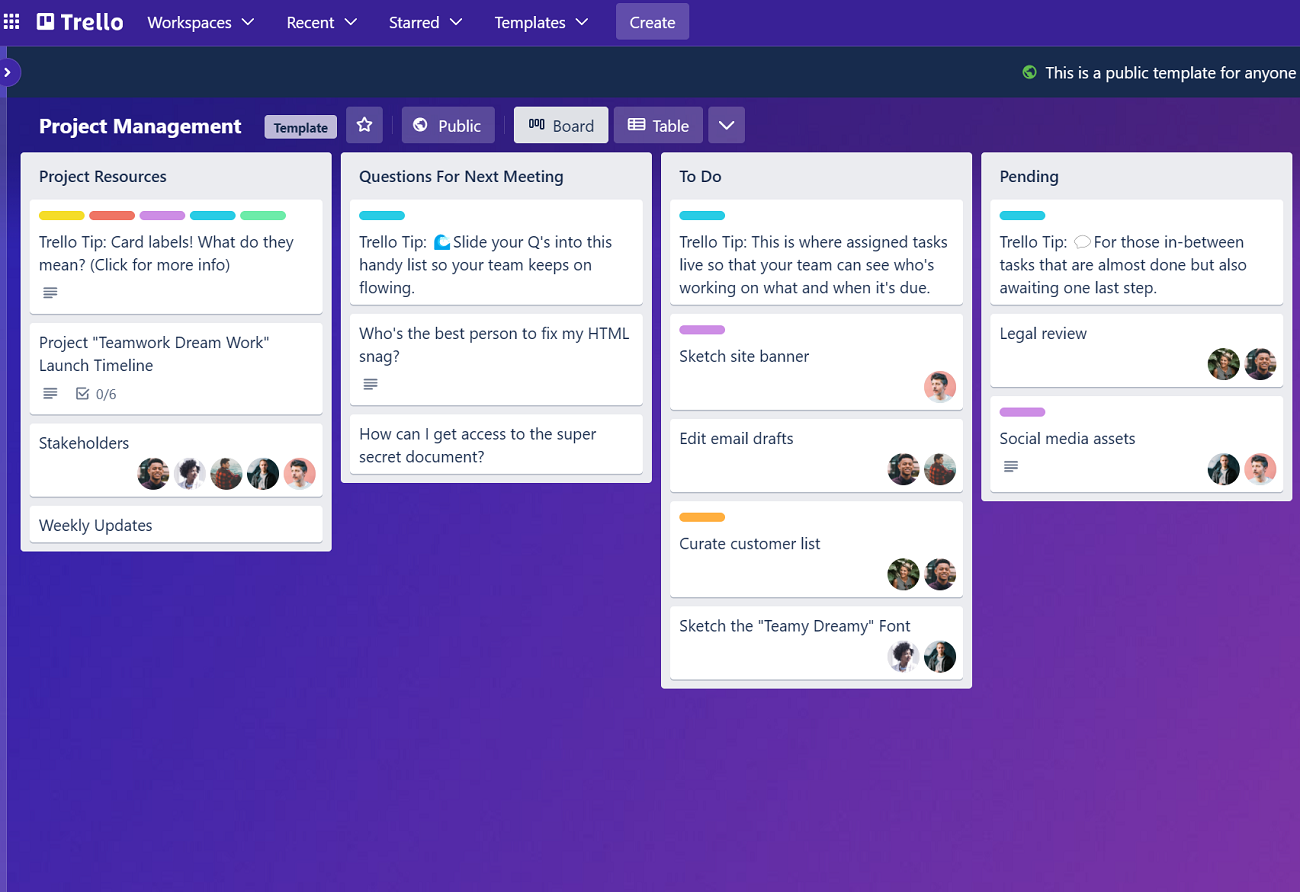
Trello offers 195+ integrations, including Google Calendar, Slack, Miro, Zapier and Jira.
We simply picked Trello because of its Kanban boards, which offer an incredibly visual and intuitive way to manage projects. These Kanban boards are simple to set up and make it easy to track projects, making Trello an excellent tool for small businesses that fancy a straightforward, no-frills approach to project management.
For more information, read our comprehensive Trello review.

ClickUp is an advanced project management software platform whose mission is to raise the productivity of its users and give them back at least 20% of their time to use on other activities. It delivers customizable pre-built automation recipes and visualization and planning capabilities to provide teams with beautiful views to plan and track their projects from beginning to end. It is also a popular choice for small businesses that utilize Agile product development, sales teams and marketing teams.
Beyond a free plan, ClickUp offers an Unlimited plan at $7 per user per month billed annually and a Business plan at $12 per user per month billed annually. It also offers enterprise-level pricing upon request.
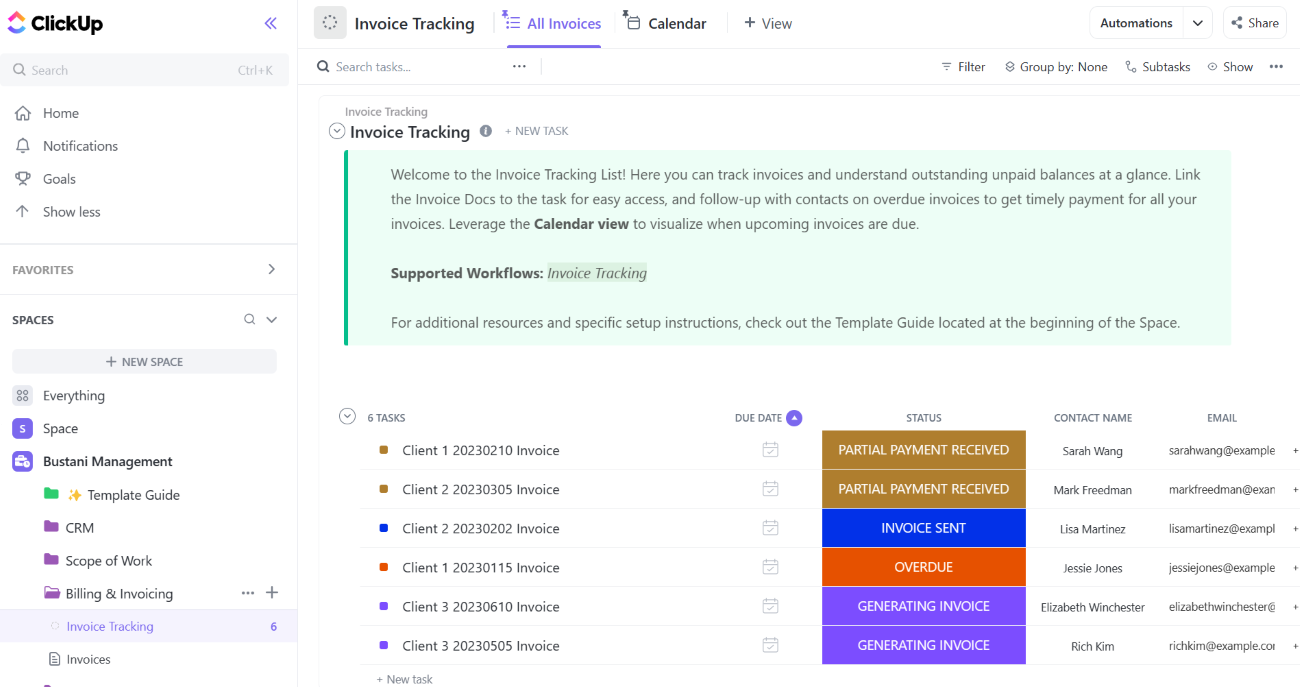
ClickUp offers 1000+ integrations, with 40+ native integrations, including Tableau, Discord, Miro, Zendesk, Twilio, Front, GitLab and Time Doctor.
ClickUp is a powerhouse of customization. Its multiple views and extensive automation options make it a versatile tool that can adapt to complex project requirements. For small teams with diverse project management needs, ClickUp is definitely worth considering.
For more information, check out our full ClickUp review.

With the initial appearance of a spreadsheet, Airtable is a powerful project management software tool that fosters collaboration between teams that allows them to model their projects, define relationships and generate views tailored to their work. This makes Airtable a worthy choice for small businesses that base their project data on spreadsheets.
Airtable offers numerous project management templates for different use cases to give its users the ability to pick up the tool with a minimized learning curve. Airtable is also arguably the easiest tool to use on this list.
Airtable provides a 14-day free trial of its Pro version to give you a taste of its advanced features. The Plus plan starts at $10 per seat per month, billed annually, while the Pro plan is priced at $20 per seat per month, also billed annually.
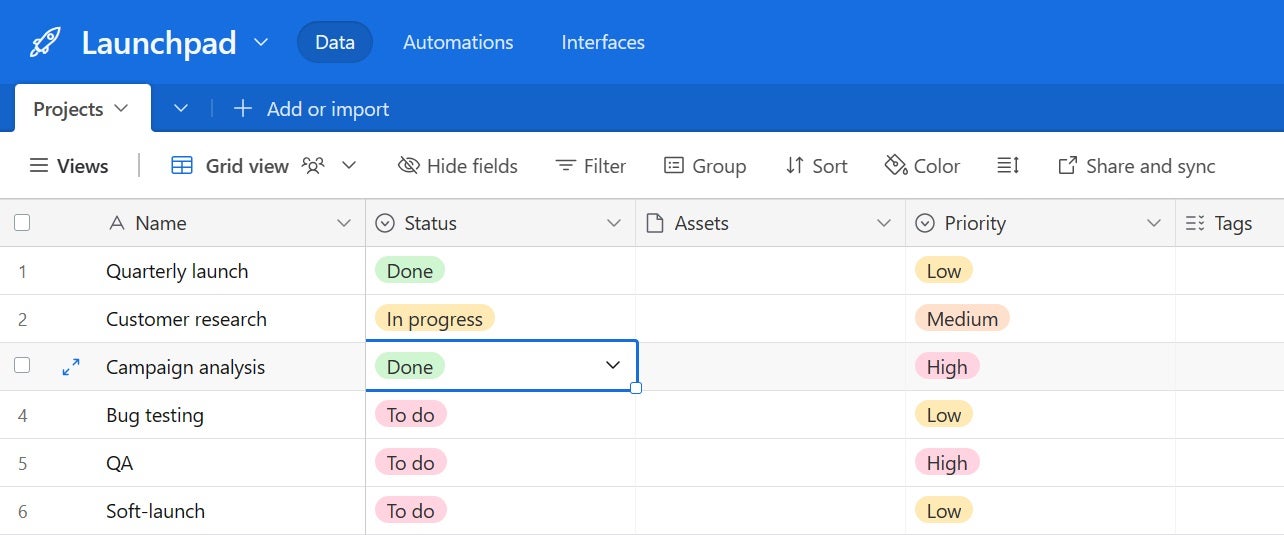
Airtable offers integration with around 30+ tools, including Google Drive, Basecamp, Zendesk, Facebook, GitHub and Salesforce.
Airtable’s spreadsheet-like interface is a game-changer for data-driven teams. It merges the simplicity of a spreadsheet with the effectiveness of a database, making it incredibly versatile for various project types.
For more information, check out our full Airtable review.

Notion is a versatile workspace that combines elements of project management, documentation and collaboration. Particularly when it comes to its note-taking capabilities, Notion gives small businesses an easy and intuitive interface to collaborate through an all-in-one workspace. It also offers a wide range of templates and customization options, which is a time-saver for teams.
In addition to a free plan, Notion offers three paid plans Plus, Business and Enterprise, of which the Plus and Business plans start at $8 and $15 per user per month when billed annually. The Enterprise plan requires you to reach out to Notion for a quote.
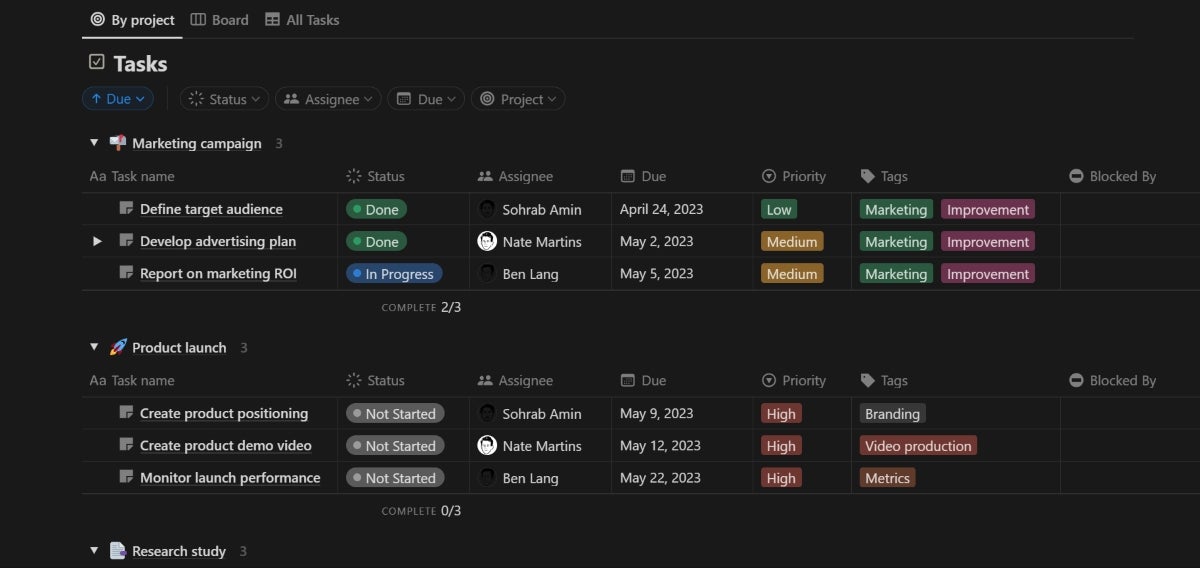
Notion offers 70+ integrations as it integrates with popular tools like Slack, Google Drive and Jira, AdobeXD and more.
The way Notion blends elements of project management, documentation and collaboration into a single platform makes it a truly compelling choice for small businesses. Its note-taking features also stand out by adding an extra dimension to keeping not only small teams but also small agencies organized.
For more information, read our full Notion review.

Todoist is a task management tool that focuses on simplicity and effectiveness. Its clean interface and intuitive features make it easy to manage tasks and projects. It prioritizes simplicity and focus through features like today, upcoming and custom filters to sort and prioritize work.
Todoist offers a free plan and two premium plans, Pro and Business at $4 and $6 per user per month billed annually.
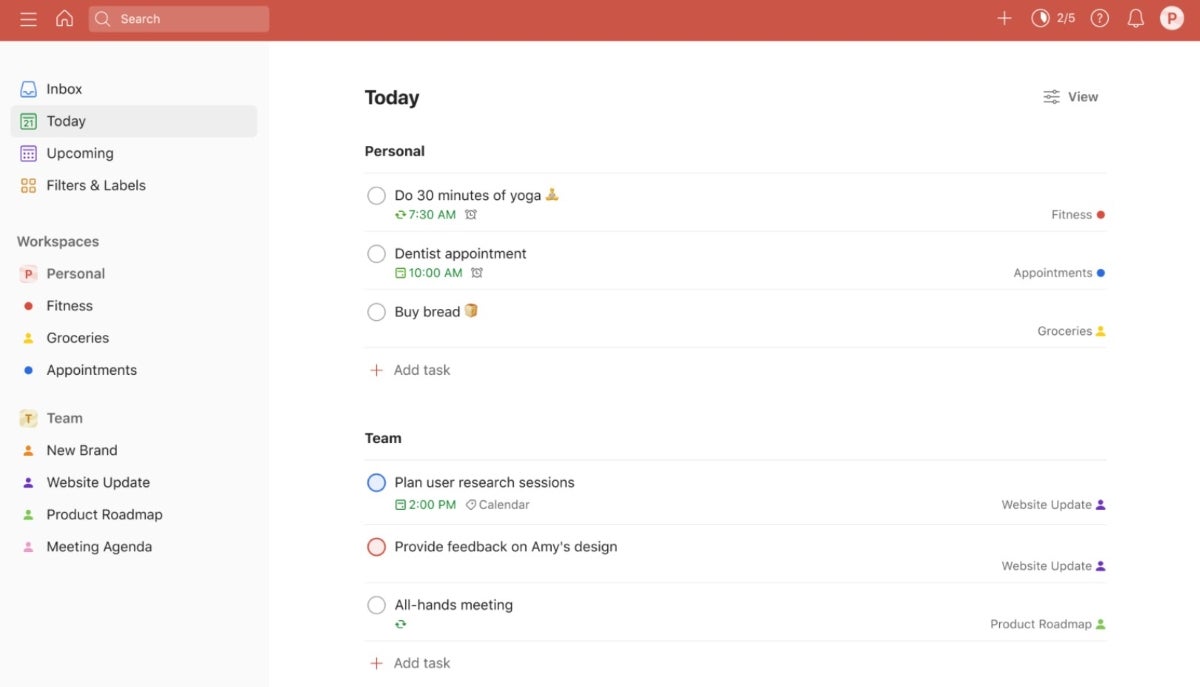
Todoist offers integrations with tools like Google Calendar, Beeminder, Apiway, Boardy, Firefox, Jira and Amazon Alexa.
Todoist excels in being both simple and functional, with a clean interface and intuitive features like natural language input, which make it a breeze to manage tasks and projects. For small businesses looking for a straightforward, effective way to stay organized, Todoist is a top pick.
For more information, check out our full Todoist review.

Teamwork is a project management tool created to maximize collaboration and efficiency within teams. It offers a suite of features that small teams can appreciate, which go beyond mere task management, including time tracking, resource allocation and advanced reporting capabilities. This makes Teamwork a great consideration for small businesses with resource-intensive projects.
Teamwork offers a free plan and four premium plans. The Starter, Deliver and Grow plans are priced at $5.99, $9.99 and $19.99 per user per month, all billed annually; while the last plan, Scale, requires you to contact Teamwork for a quote.
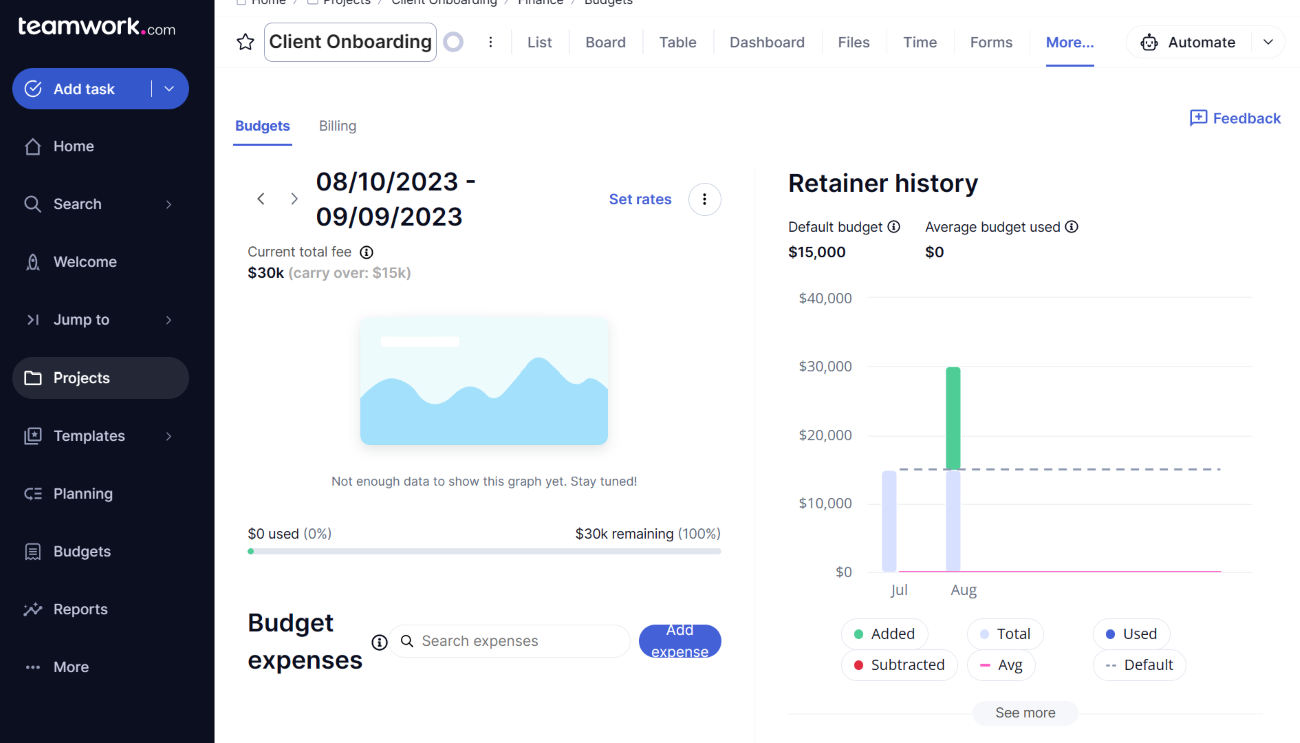
Teamwork integrates with a range of tools, including Skyvia, MS Teams, Stripe, HubSpot and QuickBooks.
Teamwork offers Teamwork Spaces, which allow for the creation of dedicated workspaces for each project and can integrate with other tools to bring all relevant information into one place.
For more information, read our full Teamwork review.

Zoho Projects is a cloud-based tool that helps teams track and collaborate on their projects while becoming more productive. It’s part of the Zoho Suite that offers a comprehensive set of project management features like time tracking, task management and advanced reporting capabilities.
Its three plans are Free, Premium and Enterprise, of which the latter two cost $4 and $9 per user per month when billed annually.

Zoho Projects integrates with other Zoho Suite products, like Zoho CRM and Zoho Analytics, offering a seamless workflow within the Zoho ecosystem. It also supports third-party integrations like Google Workspace and Microsoft Office.
Zoho Projects consists of a set of features that cater to both simple and complex project needs. It’s especially worth choosing if you’re already a member of the Zoho Suite and is a great choice for small agile teams as well as remote teams.
For more information, read our full Zoho Projects review.
Project management software tools provide a variety of features to impact businesses of any size. However, the features they offer that complement small businesses include:
Collaboration capabilities are key to project management solutions, as real-time collaboration directly impacts the overall efficiency of a business. Modern project management tools, therefore, must have some form of built-in collaboration to improve the business processes of their users.
Project management software should deliver views that can support different project management methodologies. These views should also provide an impactful level of customization that makes the software not only more flexible but also easier to use.
Effective project management tools provide integration with the applications that are most important to their users and their tech stacks.
The effectiveness and productivity of small businesses benefit from managing user roles. Modern project management software tools provide the ability to not only assign project permissions and roles but also customize them.
Regardless of the size of the business, time tracking features are essential in competent project management software tools, as it is crucial to be aware of how much time teams spend on tasks to direct efficiency.
Kanban boards help small businesses track the progress of their tasks and identify the ones that are closest to completion. They are simple to use and easily complement the collaboration that is characteristic of small teams.
Reporting and analysis ensure that small businesses get actionable insights from the status of their projects.
To understand the top project management tools for small businesses, we compared the tools above across the features that greatly impact small businesses, including collaboration, integration and reporting. We also considered the cost and prioritized tools that we felt would be cost-effective for small businesses. Then we tested the tools for a hands-on experience and compared our experience with verified user reviews to see how similar our experiences were to those of other users.
To make sure you select the correct project management software, you must first and foremost consider your budget. You should know exactly what you are willing to spend as a small business, as this plays a part in determining which features you will be willing to pay for. As can be noted from the list above, all these tools are priced per user. With your budget considerations, make sure that you can select the tool that best covers the members of your team.
You should be aware of the must-have features that you expect your choice of software to offer. Choosing a tool with the core features you require ensures that you meet the minimum requirements for functional project management in your business. After this, you should look out for standout features for your use case. These are the features to truly transform or elevate your project management. These are also the features that truly address the gaps in your use case that other project management software tools fail to cover.
Integrations are another consideration. It is crucial to evaluate integrations, as you should have project management software that is integrable with your most important applications. With integrations, you should consider whether quality or quantity matters in your use case. Perhaps you need integration with just a handful of key applications. A tool that offers over 2,000 integrations but lacks the applications that matter to you misses the mark. But if you require software that is integrable with as many applications as possible, it becomes worthy of consideration.
Finally, always take up the chance to test out software. Where there are free trials or even free plans, take advantage of them to inform your subscription decision. Nothing beats getting a first-hand feel of a product.